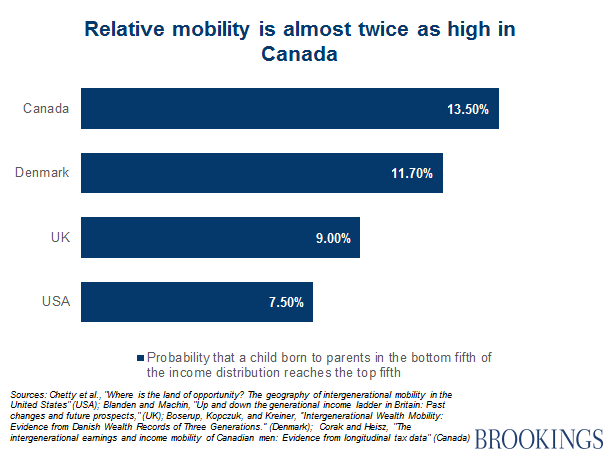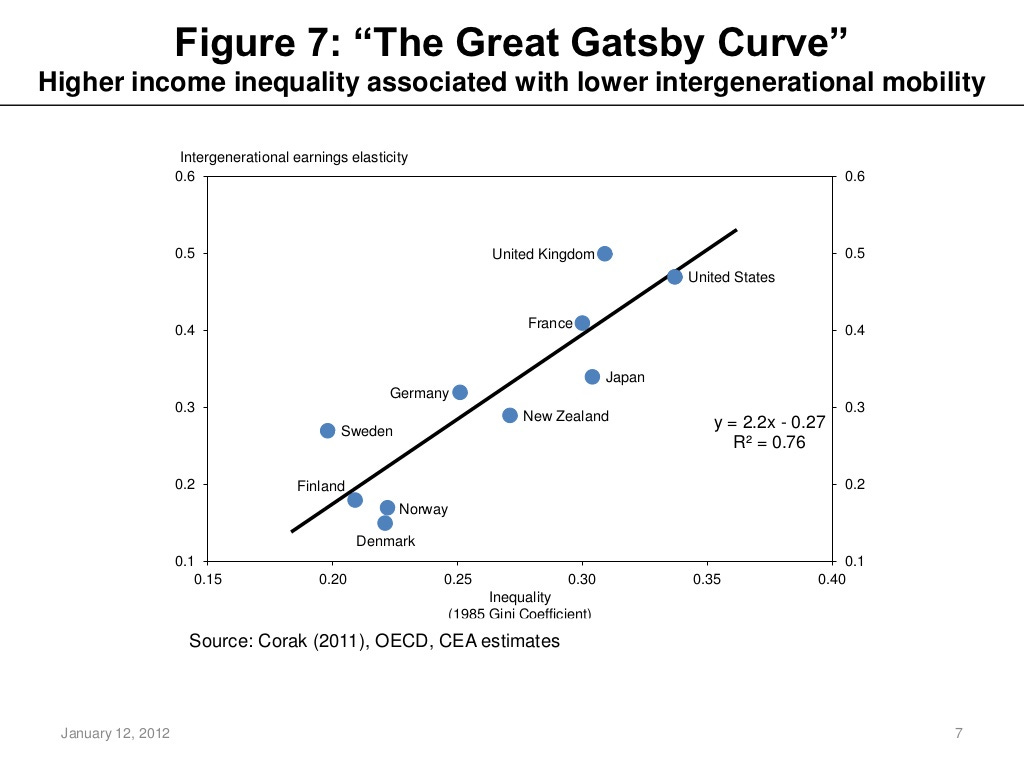The American Dream, More Myth than Reality
If Americans want to live the American dream, they should go to Denmark. -Richard Wilkinson
The American Dream: Anyone can make it big through hard work, perseverance, and a little bit of luck. The ideal of equal opportunity has brought millions of people to our shores and has inspired millions more to take risks and dream big. But the American Dream isn’t just a catchphrase; it’s an observable, measurable phenomenon: Socioeconomic mobility.
Socioeconomic mobility is the movement of individuals between social strata. Someone experiences intragenerational upward mobility when they rise from poverty to wealth within their lifetime. (Think of rags-to-riches stories) Similarly, someone experiences intergenerational upward mobility when they grow up to be wealthier than their parents. (Think of my-parents-worked-80-hour-weeks-to-finance-their-beanie-baby-collection-which-I-sold-for-15-million-dollars-when-they-died stories)
In a maximally meritocratic society a parent’s wealth would have no impact on the economic conditions of their children. 20% of children born in the bottom quintile would stay in the bottom quintile as adults, and 20% would reach the top quintile of economic well-being. In the same way, 20% of children born in the top quintile would stay there, and 20% would fall to the bottom quintile.
In the US this is not the case. 43-45% of children born in the bottom quintile remain there their entire lives. Only 4-7% of these children reach the top quintile. Furthermore, there is a large racial disparity when it comes to mobility. Black boys have lower incomes in adulthood than white boys in 99% of Census tracts.
The US lags behind the international community in this regard. Relative mobility is nearly twice as high in Canada, and parent wealth affects student achievement more than in any other OECD country.
Some economists (and one misinformed co-contributor) would argue that none of this matters. As long as an individual’s economic conditions improve they’re benefiting, even if someone else is benefiting more. As such, looking at measures of relative mobility is irrelevant; the only thing that matters is absolute, real income growth mobility.
I disagree with them for two reasons. First, robust relative mobility is an important indicator of a just society. As stated by philosopher David Beetham, the process of open competition in a meritocracy ensures that those most suited to hold wealth acquire it. However, for these processes to be effective there must be “equality of opportunity and a principle of non-discrimination.” Each of these are necessary components of a truly just society. For America’s skewed distribution of economic outcomes to occur one of three things must be happening. First, God could be cursing us for our hubris. While we are certainly hubristic, after 2020 I think He got all the vengeance out of His system, so I doubt this is the case. Second, some claim that rich kids are just smarter than poor kids. While there is a gap between the IQs of rich and poor kids, there is also an equidistant gap between kids adopted into high and low socioeconomic status households. So the difference in IQ doesn’t come from genetics; it comes from access to better schooling. This leads us to the third potential explanation: our society and economy are not equal-opportunity. There are (unjust) structures in place throughout our society that advantage the wealthy, limiting competition and keeping poor Americans trapped at the bottom. These exist in our government, our workplaces, and even my own university. If these differential outcomes happened randomly there would be no problem, but an economic distribution predicated upon discrimination against the poor is intolerable.
This lack of competition should be especially concerning to economists since competition is a necessary component of an effective economy. The same structural factors that prevent social mobility prevent low-income Americans from equally participating in our economy. Recent research demonstrates that a lack of mobility and exposure to innovators keeps low-income children from inventing in the future by “screening out the Einsteins who produce innovations that have the greatest impacts on society.” Focusing solely on absolute mobility isn’t just bad for America, I find this position to be un-American because competition is one of the big Cs that make America unique. (Those being Competition, Creativity, and Casual racism)
I also disagree with them because the data just doesn’t back them up. While the American economy has thrived in the aggregate, between 33% and 50% of Americans have lower real incomes than their parents. This isn’t just due to the Great Beanie Baby Crash of ‘99. Income inequality has risen dramatically over the last 50 years. Aggregate benefits just don’t trickle down to a shrinking middle class. Even in times of economic downturn wealth becomes more concentrated at the top. 95% of post-recession growth went to the top 1%, and we’re seeing similar effects emerge as part of coronavirus aid packages. This increased inequality decreases social mobility in a relationship Alan Krueger nicknamed the Great Gatsby curve. The reason why increased inequality reduces mobility is simple: it’s harder to climb a ladder when the rungs are further apart.
Socioeconomic mobility isn’t just a necessary component of a just society, it is a core part of our American identity. Our founding fathers dreamt of a country where anyone can make it big, but increasing inequality and decreasing mobility mean that low-income Americans are trapped at the bottom. For them, the American Dream is merely that: a dream.







Wow, great post Grady!
"In a maximally meritocratic society a parent’s wealth would have no impact on the economic conditions of their children."
I don't think this is completely true. In a maximally meritocratic society one's economic conditions would depend on their productivity. There are several things that impact productivity that come from parents. Genetic determinants of IQ and personality, how the parents choose to raise their children, how the parents choose to spend money on their children, and what opportunities that parents make available to their kids. Since we're in a maximally meritocratic society in this hypothetical, it stands to reason that parents in the high productivity quintiles would be better in several respects at producing high productivity children. Since the ability to pass on and cultivate merit in children depends in part on the merit of parents, the children's income would correlate with their parent's income.
That being said, I definitely agree that the US is not a maximally meritocratic society and that we should take down barriers to participation and competition ASAP. Occupational licensing is a huge barrier to competition and participation that comes to mind. Moving to cities has been the source of most of the globe's social mobility over the past millennia so freeing them of regulation and allowing them to grow would also explode social mobility. Border controls are also obviously a huge barrier to international social mobility.